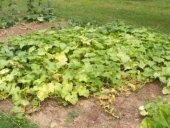












permaculture wiki: www.permies.com/permaculture




I never fail. I don't believe in it. I only succeed at finding what doesn't work.




Rob S. aka Blitz wrote:
Agreed. I have found that keeping them really covered well helps. I used a little grill starter, the kind with wind resistant flame, and burned the little creeps off. This was last year...I have seen a few eggs this year and those were squished.




permaculture wiki: www.permies.com/permaculture




Be kinder than necessary, for everyone you meet is fighting some kind of battle.








James Stark wrote:
10 cups water, 1 cup raw, unpasturized milk (pasturized milk is missing the helpful microbes), a bunch of crushed garlic (a good handful), and a teaspoon of cayenne pepper powder. Let it all soak together for an hour, then strain through a nylon stocking into a garden sprayer. Spray tops and bottoms of plants thoroughly. Do it in the evening, since it needs to sit on the plants overnight.
Hello from a newbie. Would organic yogurt work for this recipe? Haven't spotted any beetles, but forwarned...
Just as a side note, all the books I've ever read say that chickens won't eat potato bugs, but I guess my chickens never read any of those books, cuz they love em. They spend about an hour just before the sun goes down in the tater patch eating the bugs every evening.
Gardener, what's that fly doing in my compost tea?




I never fail. I don't believe in it. I only succeed at finding what doesn't work.




James Stark wrote:
I find the chickens do very little damage to the plants themselves. Once in a while a chicken will scratch for bugs at the base of the plant, but they don't eat the plants at all, so as long as they are established I've had no losses due to the chickens.
Gardener, what's that fly doing in my compost tea?




I never fail. I don't believe in it. I only succeed at finding what doesn't work.




Gardener, what's that fly doing in my compost tea?




James Stark wrote:
I find the chickens do very little damage to the plants themselves. Once in a while a chicken will scratch for bugs at the base of the plant, but they don't eat the plants at all, so as long as they are established I've had no losses due to the chickens.

|
So then I told Joseph Stalin to piss off! Remember that tiny ad?
permaculture thorns, A Book About Trying to Build Permaculture Community - draft eBook
https://permies.com/wiki/123760/permaculture-thorns-Book-Build-Permaculture
|



